Sir John Monash, Personal Files Book 2, 23 February - 31 March 1915, Part 3
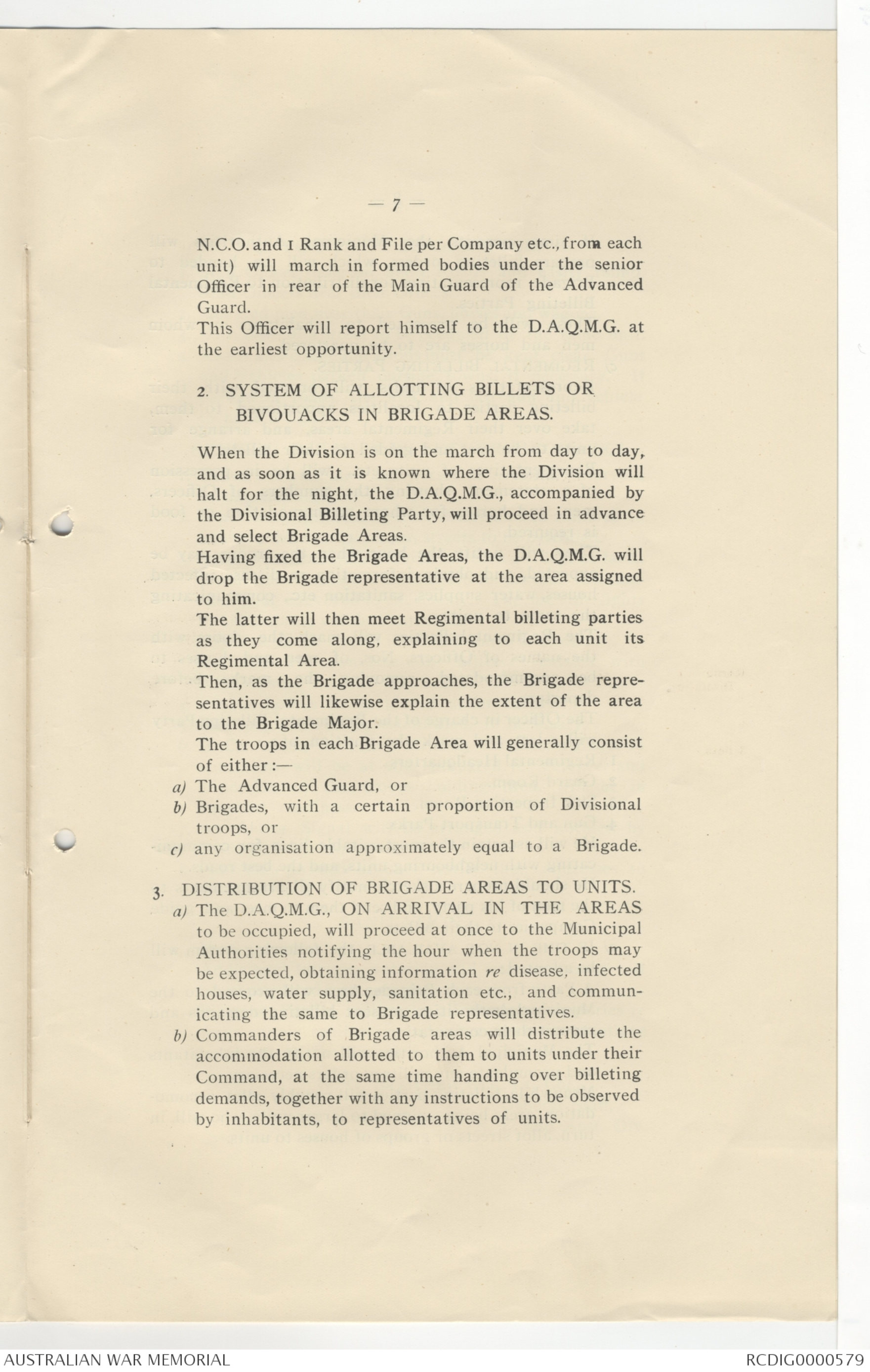
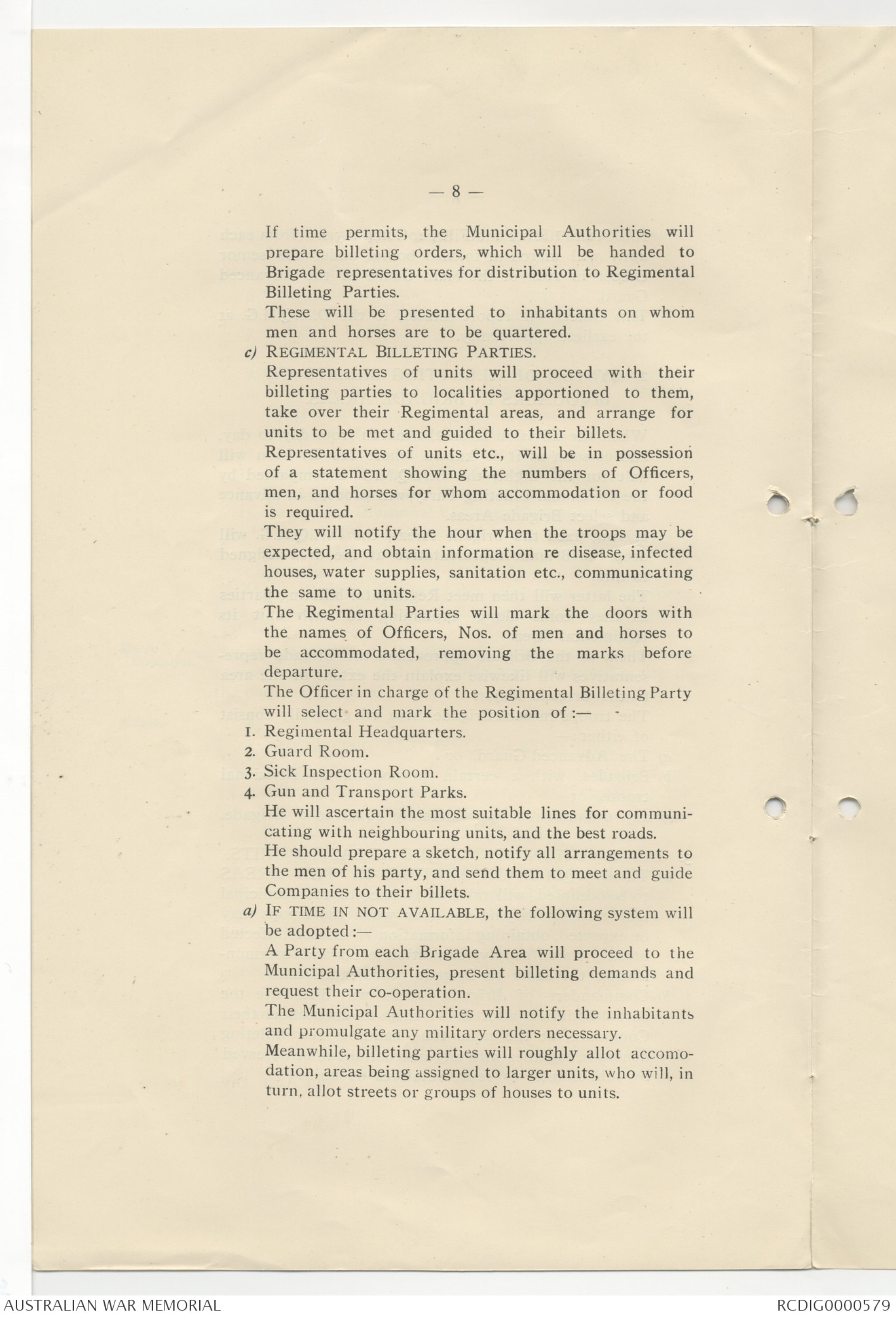
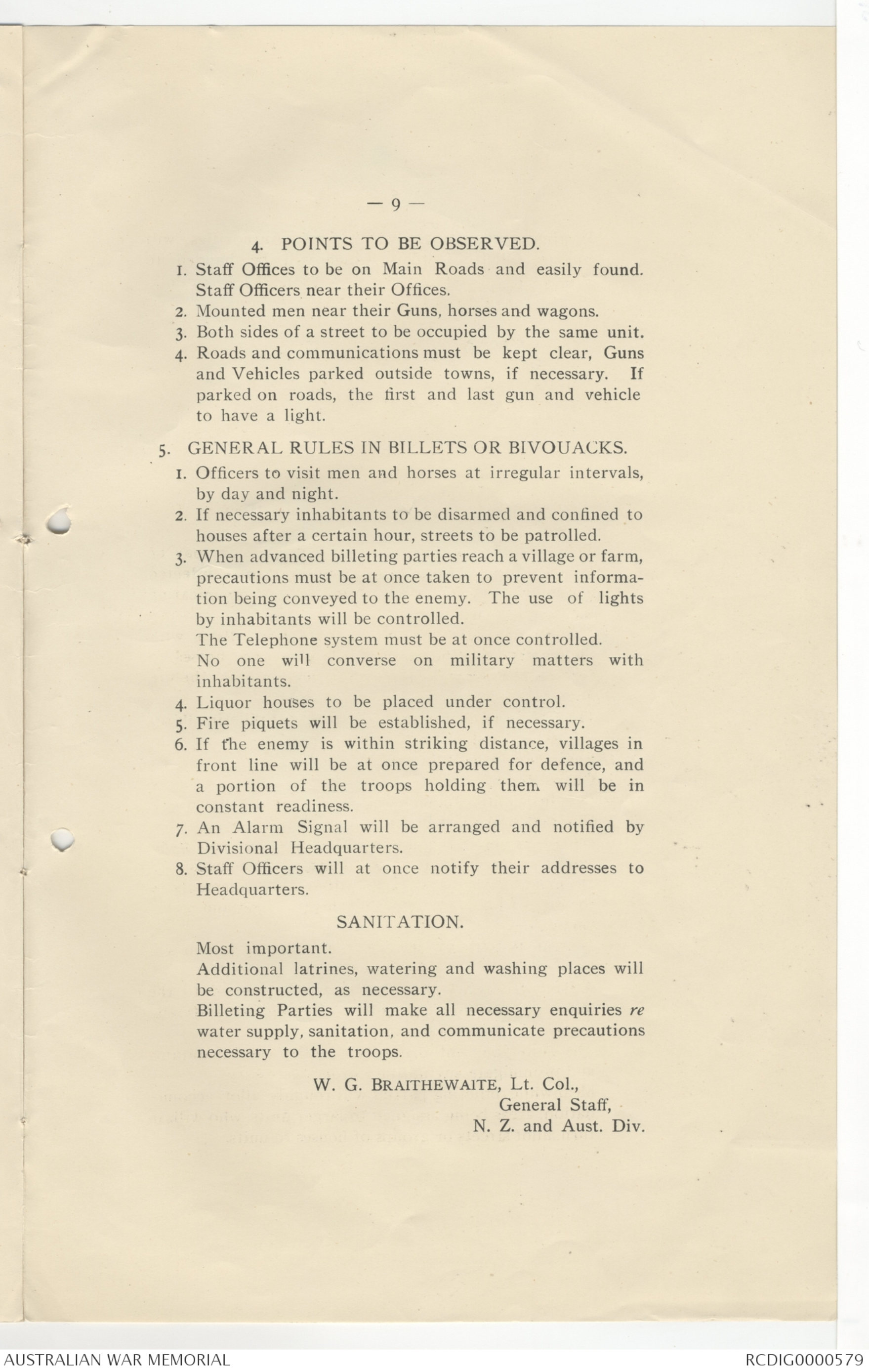
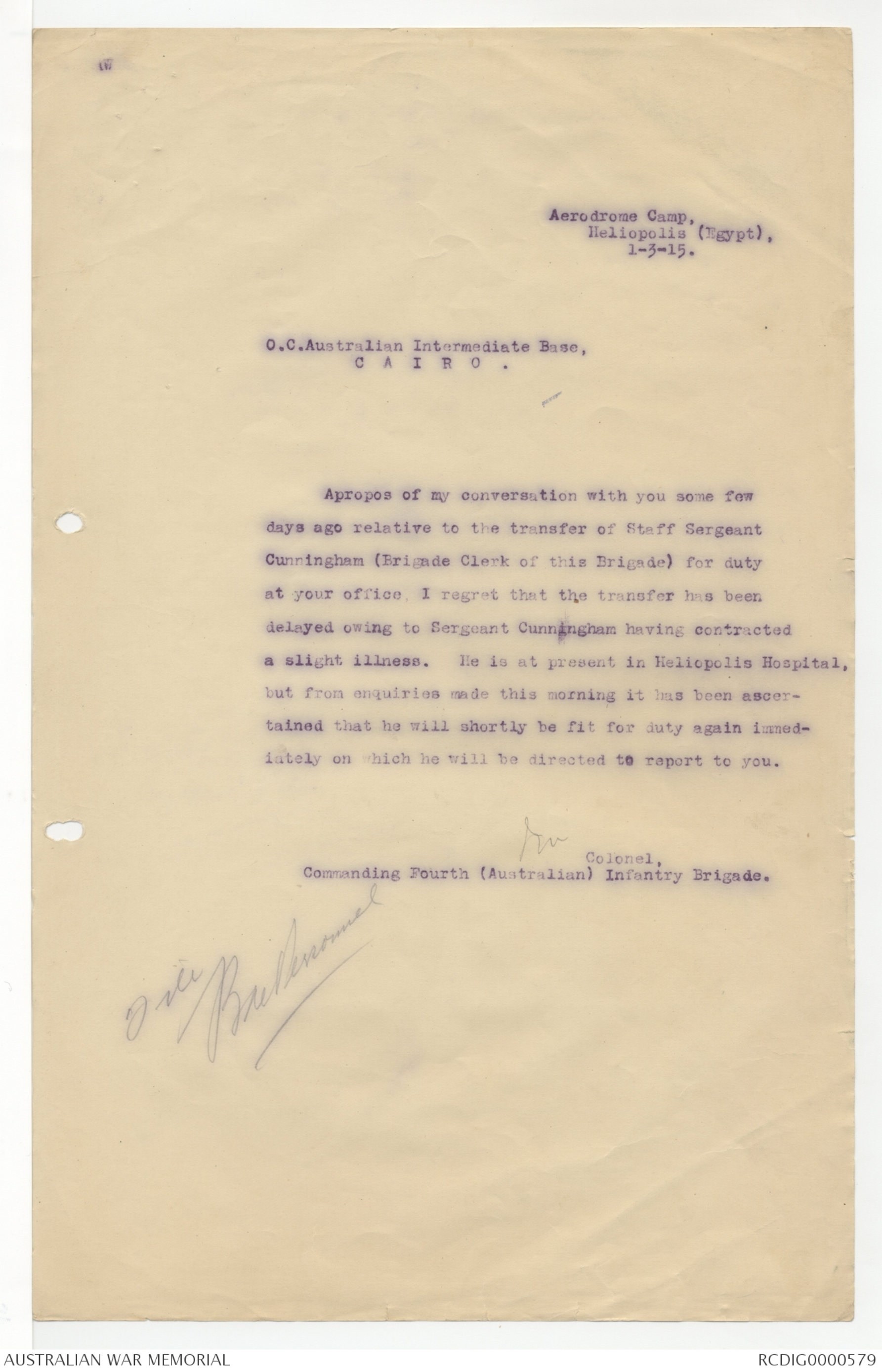
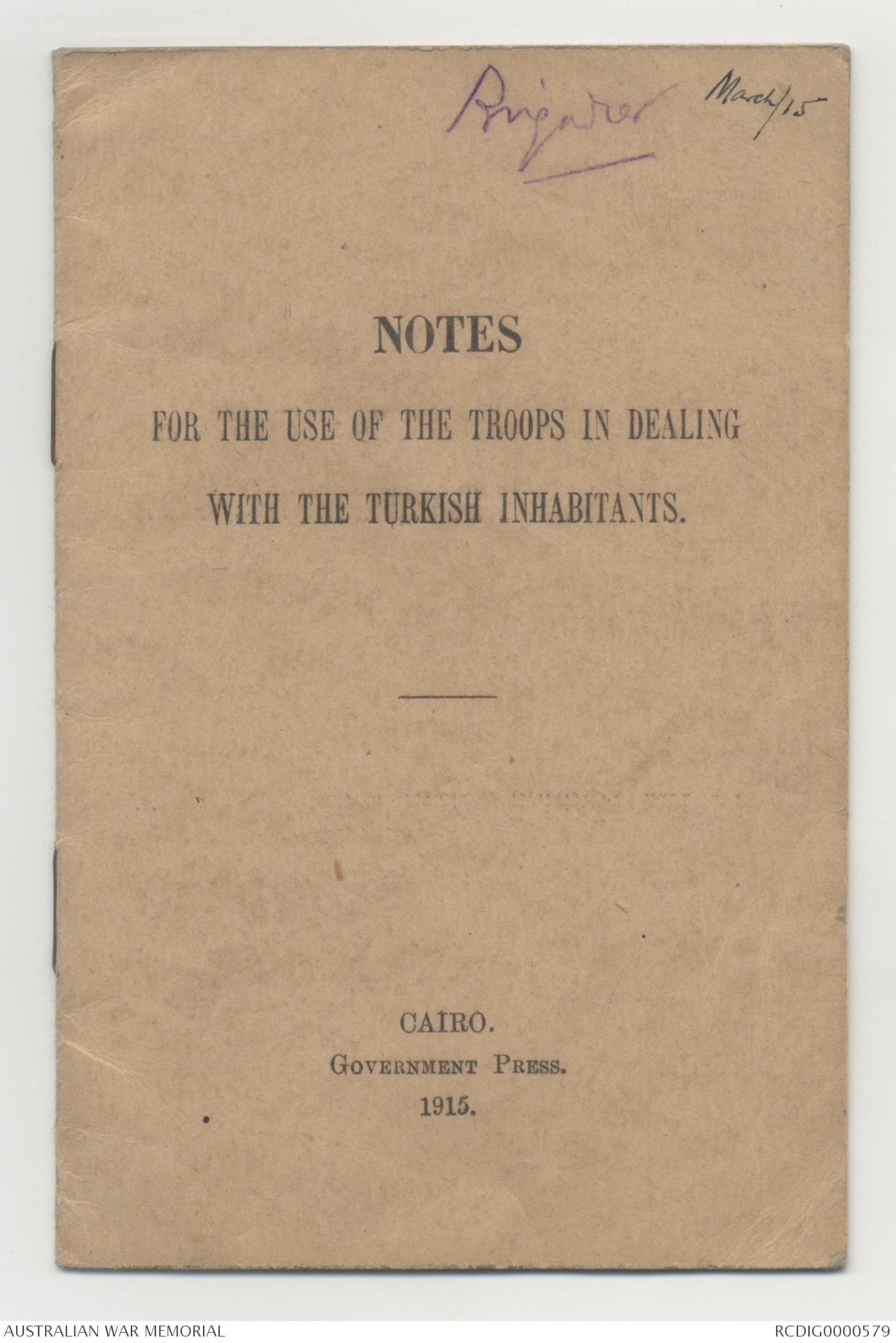
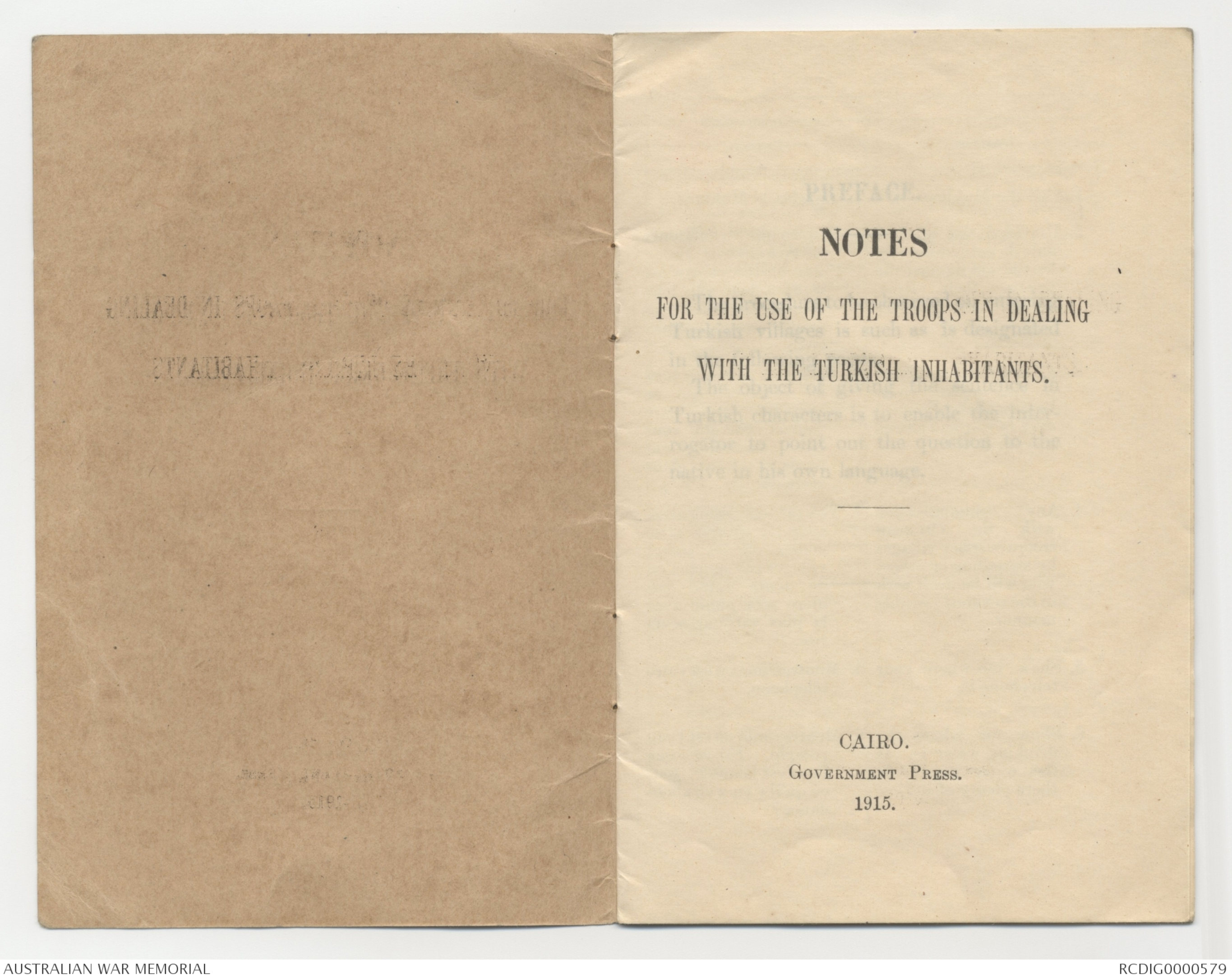
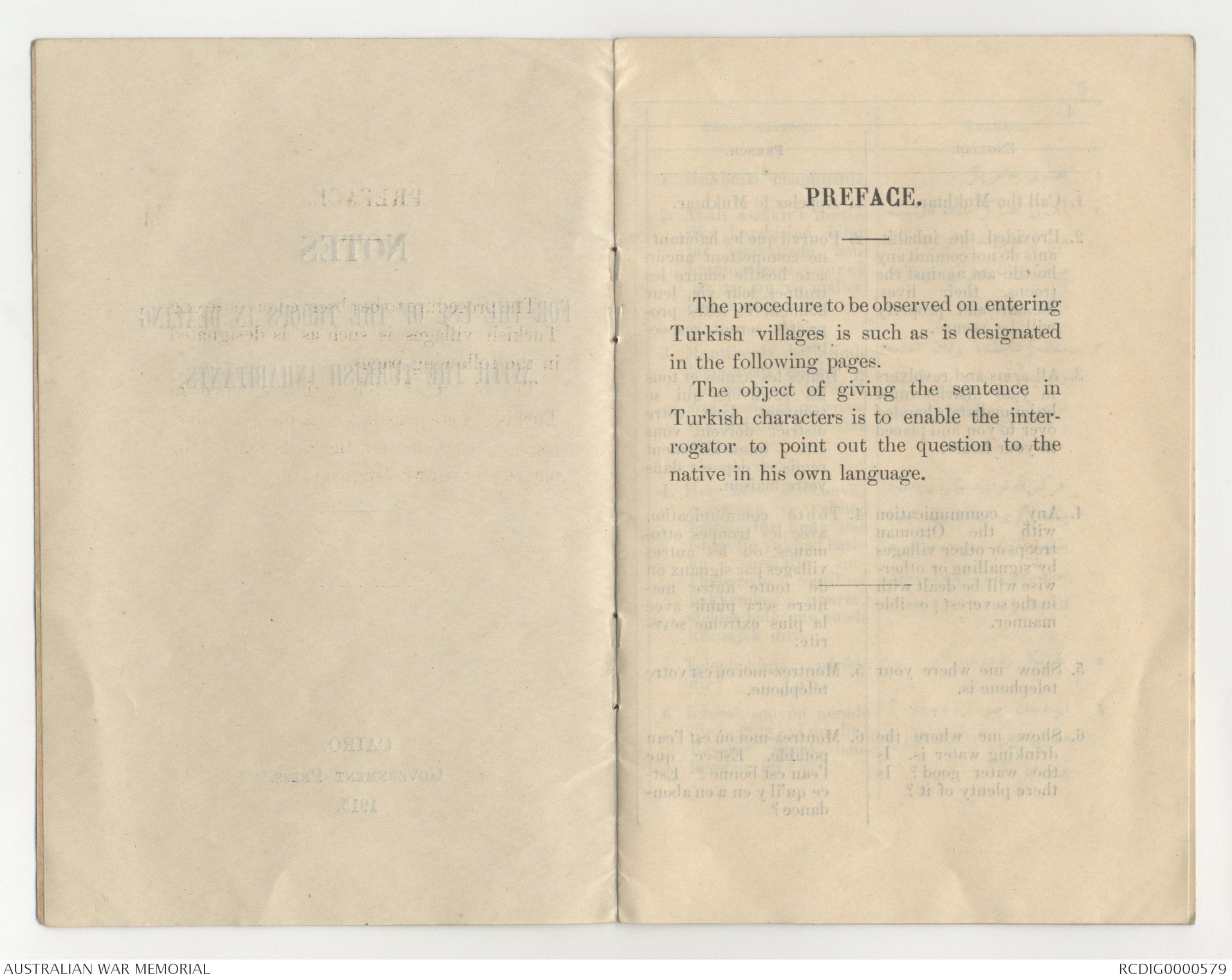
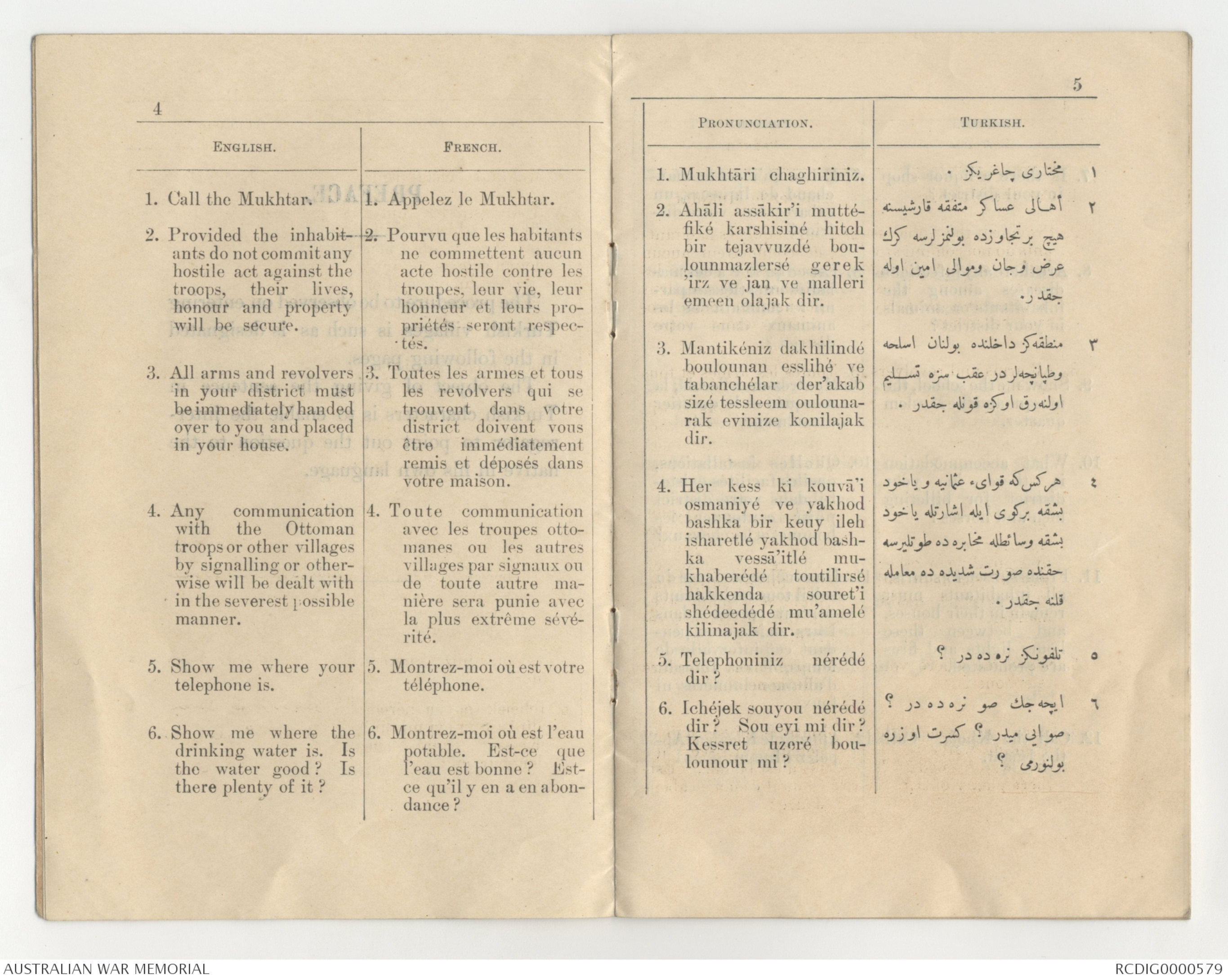
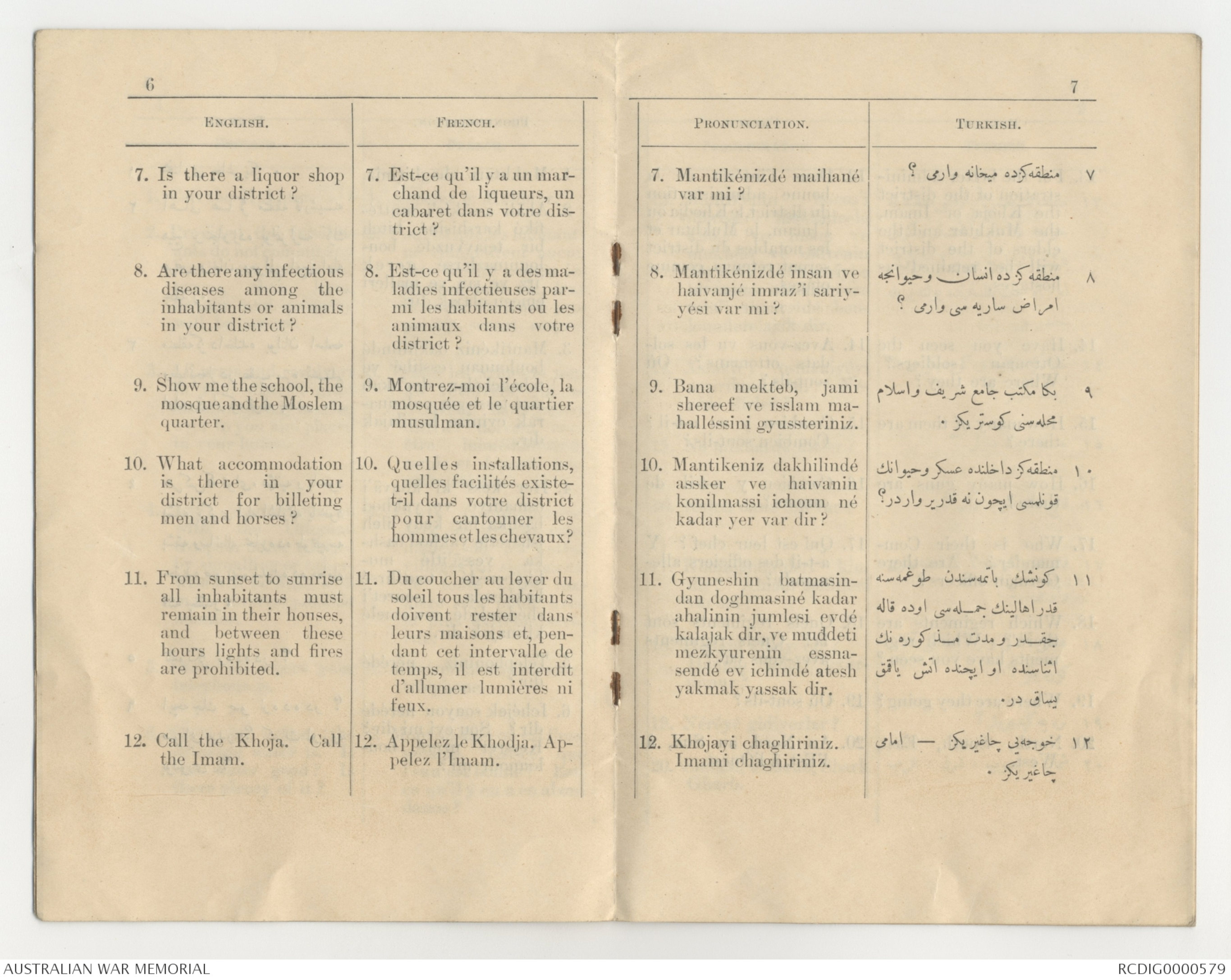
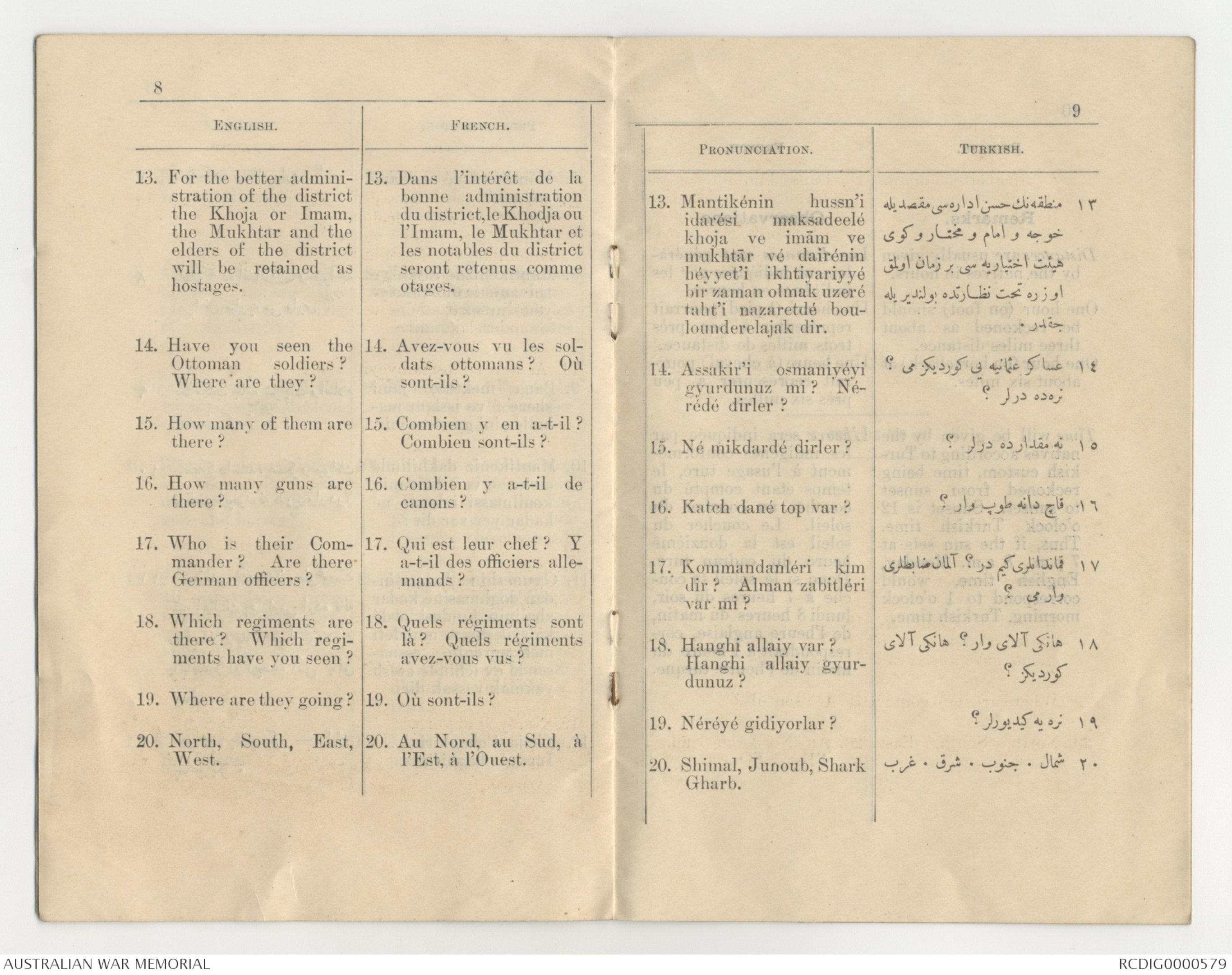
-7-
N.C.O. and 1 Rank and File per Company etc., from each
unit) will march in formed bodies under the senior
Officer in rear of the Main Guard of the Advanced
Guard.
This Officer will report himself to the D.A.Q.M.G at
the earliest opportunity.
2. SYSTEM OF ALLOTTING BILLETS OR
BIVOUACKS IN BRIGADE AREAS.
When the Division is on the march from day to day,
and as soon as it is known where the Division will
halt for the night, the D.A.Q.M.G., accompanied by
the Divisional Billeting Party, will proceed in advance
and select Brigade Areas.
Having fixed the Brigade Areas, the D.A Q.M.G. will
drop the Brigade representative at the area assigned
to him.
The latter will then meet Regimental billeting parties
as they come along, explaining to each unit its
Regimental Area.
Then, as the Brigade approaches, the Brigade repre-
sentatives will likewise explain the extent of the area
to the Brigade Major.
The troops in each Brigade Area will generally consist
of either:-
a) The Advanced Guard, or
b) Brigades, with a certain proportion of Divisional
troops, or
c) any organisation approximately equal to a Brigade.
3. DISTRIBUTION OF BRIGADE AREAS TO UNITS.
a) The D.A.Q.M.G., ON ARRIVAL IN THE AREAS
to be occupied, will proceed at once to the Municipal
Authorities, notifying the hour when the troops may
be expected, obtaining information re disease, infected
houses, water supply, sanitation etc., and commun-
icating the same to Brigade representatives.
b) Commanders of Brigade areas will distribute the
accommodation allotted to them to units under their
Command, at the same time handling over billeting
demands, together with any instructions to be observed
by inhabitants, to representatives of units.
-8-
If time permits, the Municipal Authorities will
prepare billeting orders, which will be handed to
Brigade representatives for distribution to Regimental
Billeting Parties.
These will be presented to inhabitants on whom
men and horses are to be quartered.
c) REGIMENTAL BILLETING PARTIES
Representatives of units will proceed with their
billeting parties to localities apportioned to them,
take over their Regimental areas, and arrange for
units to be met and guided to their billets.
Representatives of units etc., will be in possession
of a statement showing the numbers of Officers,
men, and horses for whom accommodation or food
is required.
They will notify the hour when the troops may be
expected, and obtain information re disease, infected
houses, water supplies, sanitation etc., communicating
the same to units.
The Regimental Parties will mark the doors with
the names of Officers, Nos. of men and horses to
be accommodated, removing the marks before
departure.
The Officer in charge of the Regimental Billeting Party
will select and mark the position of:-
1. Regimental Headquarters.
2. Guard Room.
3. Sick Inspection Room.
4. Gun and Transport Parks.
He will ascertain the most suitable lines for communicating
with neighbouring units, and the best roads.
He should prepare a sketch, notify all arrangements to
the men of his party, and send them to meet and guide
Companies to their billets.
a) IF TIME IN NOT AVAILABLE, the following system will
be adopted:-
A Party from each Brigade Area will proceed to the
Municipal Authorities, present billeting demands and
request their co-operation.
The Municipal Authorities will notify the inhabitants
and promulgate any military orders necessary.
Meanwhile, billeting parties will roughly allot accomodation,
areas being assigned to larger units, who will, in
turn, allot streets or groups of houses to units.
- 9 -
4. POINTS TO BE OBSERVED.
- Staff Offices to be on Main Roads and easily found.
Staff Officers near their Offices. - Mounted men near their Guns, horses and wagons.
- Both sides of a street to be occupied by the same unit.
- Roads and communications must be kept clear, Guns
and Vehicles parked outside towns, if necessary. If
parked on roads, the first and last gun and vehicle
to have a light. -
GENERAL RULES IN BILLETS OR BIVOUACKS.
1. Officers to visit men and horses at irregular intervals,
by day and night.
2. If necessary inhabitants to be disarmed and confined to
houses after a certain hour, streets to be patrolled.
3. When advanced billeting parties reach a village or farm,
precautions must be at once taken to prevent information
being conveyed to the enemy. The use of lights
by inhabitants will be controlled.
The Telephone system must be at once controlled.
No one will converse on military matters with
inhabitants.
4. Liquor houses to be placed under control.
5. Fire piquets will be established, if necessary.
6. If the enemy is within striking distance, villages in
front line will be at once prepared for defence, and
a portion of the troops holding them, will be in
constant readiness.
7. An Alarm Signal will be arranged and notified by
Divisional Headquarters.
8. Staff Officers will at once notify their addresses to
Headquarters.
SANITATION
Most important.
Additional latrines, watering and washing places will
be constructed, as necessary.
Billeting Parties will make all necessary enquiries re
water supply, sanitation, and communicate precautions
necessary to the troops.
W.G.BRAITHEWAITE, Lt. Col.,
General Staff,
N.Z. and Aust. Div.
Aerodrome Camp,
Heliopolis (Egypt),
1-3-15.
O.C. Australian Intermediate Base,
CAIRO.
Apropos of my conversation with you some few
days ago relative to the transfer of Staff Sergeant
Cunningham (Brigade Clerk of this Brigade)
for duty at your office I regret that the transfer has been
delayed owing to Sergeant Cunningham having contracted
a slight illness. He is at present in Heliopolis Hospital,
but from enquiries made this morning it has been ascertained
that he will shortly b fit for duty again immediately
on which he will be directed to report to you.
Signed
for Colonel,
Commanding Fourth (Australian) Infantry Brigade
File
Brethescormel
Brigadier March/15
NOTES
FOR THE USE OF THE TROOPS IN DEALING
WITH THE TURKISH INHABITANTS.
CAIRO
GOVERNMENT PRESS.
1915
NOTES
FOR THE USE OF THE TROOPS IN DEALING
WITH THE TURKISH INHABITANTS.
CAIRO
GOVERNMENT PRESS.
1915
PREFACE.
_________
The procedure to be observed on entering
Turkish villages is such as is designated
in the following pages.
The object of giving the sentence in
Turkish characters is to enable the interrogator
to point out the question to the
native in his own language.
4
| ENGLISH. | FRENCH. |
|
|
| 2. Provided the inhabitants do not commit any hostile act against the troops, their lives, honour and property will be secure |
2. Pourvu que les habitants ne commettent aucun acte hostile contre les' troupes, leur vie, leur honneur et leurs propprietes serent respectės |
| 3. All arms and revolvers in your district must be immediately handed over to you and placed in your house. |
3. Toutes les armes et tous les revolvers qui se trouvent dans votre district doivent vous être immédiatement remis et déposés dans votre maison. |
| 4. Any communication with the Ottoman troops or other villages by signalling or other- wise will be dealt with in the severest possible manner. |
4. Toute communication avec les troupes otto-manes ou les autres villages par signaux ou de toute autre manière sera punie avec la plus extrême sévé- rité. |
| 5. Show me where your telephone is |
5. Montrez-moi où est votre téléphone |
| 6. Show me where the drinking water is. Is the water good? Is there plenty of it? |
6. Montez-moi où est l'eau potable. Est-ce que l'eau est bonne? Estce qu'il y en a en abondance? |
| PRONUNCIATION | TURKISH |
|
|
| 2. Ahāli assākir'i muttéfiké karshisiné hitch bir tejavvuzdé boulounmazlersé gerek'irz ve jan ve malleri emeen olajak dir |
|
| 3. Mantikéniz dakhilindé boulounan esslihé ve tabanchélar der'akab sizé tessleem oulounarak evinize konilajak |
|
| 4. Her kess ki kouvā'i osmaniyé ve yakhod bashka bir keuy ileh isharetlé yakhod bashka vessā'itlé mukhaberédé toutilirsé hakkenda souret'i shédeedédé mu'amelé kilinajak dir |
|
| 5. Telephoniniz nérédé dir? |
|
| 6. Ichéjek souyou nérédé dir? Sou eyi mi dir? Kessret uzeré boulounour mi? |
|
| ENGLISH | FRENCH |
| 7. is there a liquor shop in your district? |
7. Est-ce qy'ily y a un marchand de liqueurs un cabaret dans votre district? |
| 8. Are there any infectious diseases among the inhabitants or animals in your district? |
Est-ce qu'ily y a des maladies infectieuses parmi les inhabitants ou les animaux dans votre district? |
| 9. Show me the school, the mosque and the Moslem quarter. |
9. Montrez-moi l'école, la mosquée le quartier musulman. |
| 10. What accommodation is there in you district for billeting men and horses? |
10. Quelles installations, quelles facilités existet-il dans votre district pour cantonner les hommes et les chevaux |
| 11. From sunset to sunrise all inhabitants must remain in their houses, and between these hours lights and fires are prohibited |
11. Du coucher au lever du soliel tous les habitants doivent rester dans leurs maison et, pendaut cet intervalle de temps il est interdit d'allumer lumiéres ni feux. |
| 12. Call the Khoja. Call the Imam. |
12. Appelez le Khodja. Appelez l'Imam. |
| PRONUNCIATION | TURKISH |
| 7. Mantikénizdé maihané var mi? |
|
| 8. Mantikénizdé insan ve haivanje imraz'i sariyyési var mi? |
|
| 9. Bana mékteb, jami shereef ve isslam mahalléssini gyussteriniz |
|
| 10. Mantikeniz dakhilindé assker ve haivanin konilmassi ichoun né kadar yer var dir? |
|
| 11. Gyuneshin batmasindan doghmasiné kadar ahalinin jumlesi evdé kalajak dir, ve muddeti mezkyurenin essnnasendé ev ichindé atesh yalamk yassaj dir. |
|
| 12. Khojayi chaghiriniz Imami chaghiriniz |
| ENGLISH | FRENCH |
| 13. For the better administration of the district the Khoja or Imam, the Mukhtar and the elders of the district will be retained as hostages |
13. Dans l'intérét de la bonne administration du district, le Khoja ou l'lmam, le Mukhtar et les notables du district seront retenus commeotages. |
| 14. Have you seen the Ottoman soldiers? Where are they? |
14. Avez-vous vu les soldats ottomans? Oū sont-ils? |
| 15. How many of them are there? |
15. Combien y en a-t-il? Combien sont-ils? |
| 16. How many guns are there? |
16. Combien y a-t-il de canons? |
| 17. Who is their Commander? Are there German officers? |
17. Qui est leur chef? Y a-t-il des officiers allemands? |
| 18. Which regiments are there? Which regiments have you seen? |
18. Quels régiments sont lā? Quels régiments avez-vou vus? |
| 19. Where are they going? | 19. Oū sont-ils? |
| 20. North, South, East, West |
20. Au Nord, au Sud, ā l'Est, ā l'Quest. |
| PRONUNCIATION | TURKISH |
| 13. Mantikénin hussn'i idarési maksadeelé khoja ve imam ve mukhtār vé dairénin héy yet'i ikhtiyariyyé bir zamam olmak uzeré taht'i nazaretdé boulounderelajak dir |
13. |
| 14. Assakir'i osmaniyéyi gyurdunuz mi? Nérédé dirler? |
14. |
| 15. Né mikdardé dirler? | 15. |
| 16. Katch dané top var? | 16. |
| 17. Kommandanléri kim dir? Alman zabitléri var mi? |
17. |
| 18. Hanghi allaiy var? Hanghi allaiy gyurdunuz? |
18. |
| 19. Néréyé gidiyorlar? | 19. |
| Shimal, Junoub, Shark, Gharb | 20. |
 Jacqueline Kennedy
Jacqueline KennedyThis transcription item is now locked to you for editing. To release the lock either Save your changes or Cancel.
This lock will be automatically released after 60 minutes of inactivity.